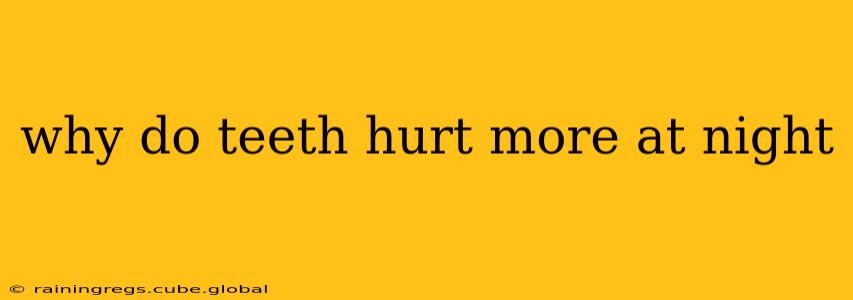Tooth pain is never fun, but experiencing intensified discomfort at night can be particularly frustrating. Many factors contribute to this nocturnal exacerbation of dental pain, and understanding them can help you manage the issue more effectively. Let's delve into the common reasons why your teeth might hurt more at night.
Why Does Tooth Sensitivity Increase at Night?
This is a frequently asked question, and the answer isn't always straightforward. It's often a combination of factors rather than a single cause.
Reduced Distractions During the Day vs. Night
One of the most significant reasons tooth pain seems worse at night is the simple absence of distractions. During the day, you're busy with work, socializing, or other activities that keep your mind occupied. At night, however, in the quiet stillness, even a mild ache can seem amplified because your attention is focused solely on the discomfort. This psychological aspect plays a crucial role.
Changes in Body Posture and Blood Flow
Your posture significantly impacts blood flow. During the day, you're generally upright, which allows for even blood distribution. However, when you lie down, blood can pool in your head and face, potentially increasing pressure and inflammation in your teeth and gums. This increased pressure can intensify pre-existing pain.
Salivary Gland Activity Decrease
Saliva plays a vital role in neutralizing acids and protecting teeth. Salivary production naturally decreases at night, leaving your teeth more vulnerable to acids and irritants. This reduced protection can lead to increased sensitivity and pain, particularly if you have cavities or gum disease.
What Could Be Causing My Nighttime Tooth Pain?
Let's explore some specific dental issues that frequently cause more intense pain at night.
Tooth Decay (Cavities)
Cavities create openings in the tooth enamel, exposing the sensitive inner layers (dentin and pulp). At night, without the distractions of daytime activities, the pain from these exposed areas becomes more noticeable.
Gum Disease (Gingivitis or Periodontitis)
Inflammation and infection in the gums can cause throbbing pain, often worsened at night due to increased blood flow to the affected area while lying down.
Abscesses
A dental abscess is a serious infection at the root of a tooth. The pressure buildup within the abscess can cause excruciating pain, which is typically amplified at night due to the change in posture and blood flow. This is a situation requiring urgent dental attention.
Bruxism (Teeth Grinding)
Grinding or clenching your teeth, especially at night (sleep bruxism), can cause significant jaw pain, tooth sensitivity, and even damage to tooth enamel. The constant pressure exacerbates any pre-existing dental issues.
Tooth Sensitivity
General tooth sensitivity can be amplified at night. Certain foods and drinks, like hot or cold beverages, may not cause discomfort during the day but can trigger pain at night due to increased blood flow and reduced salivary protection.
When Should I See a Dentist About Nighttime Tooth Pain?
If your toothache is severe, persistent, or accompanied by swelling, fever, or difficulty opening your mouth, seek immediate dental attention. Don't delay seeking professional help, as these symptoms could indicate a serious infection or other urgent dental problem. Even milder, persistent nighttime tooth pain warrants a visit to your dentist for proper diagnosis and treatment.
How Can I Reduce Nighttime Tooth Pain?
While professional dental care is crucial for addressing the underlying cause, some home remedies can help manage discomfort temporarily:
- Over-the-counter pain relievers: Ibuprofen or acetaminophen can help alleviate pain.
- Cold compress: Applying a cold compress to the affected area can reduce inflammation and numb the pain.
- Saltwater rinse: Rinsing your mouth with warm saltwater can help soothe irritated gums.
- Avoid acidic foods and drinks: Reduce consumption of acidic foods and beverages, especially before bed.
Remember, addressing the root cause of your tooth pain is essential. A visit to your dentist is the best way to determine the underlying problem and receive appropriate treatment. Ignoring nighttime tooth pain can lead to more severe issues down the line.
